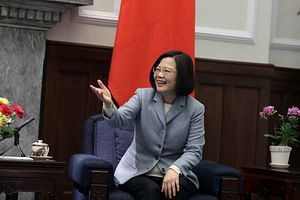China continues to chip away at Taiwan’s remaining diplomatic partners. At the start of 2018, Taipei was left with just 20 countries that recognized it diplomatically over the People’s Republic—owing to the ‘One China’ principle, all sovereign states that choose to maintain diplomatic ties with either Taiwan or China pick one or the other, but not both. Now, after the Dominican Republic’s decision to shift recognition from Taipei to Beijing, Taiwan is left with just normal diplomatic relations with 19 countries worldwide.
Since the election of the Democratic Progressive Party’s (DPP) Tsai Ing-wen to the presidency of Taiwan in 2016, China has set aside the so-called diplomatic truce that prevailed during the presidency of Ma Ying-jeou and the Kuomintang from 2008 onward. Beijing has progressively punished the independence-leaning DPP government in Taipei since Tsai’s May 2016 inaugural address, where—in Beijing’s perception—she failed to explicitly state China’s commitment to the 1992 consensus that governs stable cross-strait relations. (China sees Taiwan as part of its territory.)
Beijing didn’t wait until Tsai’s inauguration to put an end to the truce. In March 2016, when Tsai was president-elect, Beijing signed a communique with the Gambia, depriving China of one of its three African diplomatic partners (Burkina Faso and Swaziland remain). In 2017, Sao Tome and Principe and, significantly, Panama, followed suit. The loss of Panama was particularly significant, with Tsai noting that Taiwan had been aware that the development was coming. In all three of those cases—and with the Dominican Republic this week—China used its hefty checkbook to influence these countries away from Taiwan.
While economically advanced and dynamic, Taipei can’t hope to outspend Beijing and has said as much. After Panama’s decision last year, Tsai noted Taiwan’s “refusal to engage in a diplomatic bidding war” and said that Taipei would not “engage in checkbook diplomacy with the Beijing authorities.”
This week’s loss of another diplomatic partner highlights a quandary without an easy way out for Taipei. Even as the Tsai administration has sought to hedge Taiwan’s economic overreliance on the mainland with bold initiatives like the New Southbound policy, Taipei’s growing international isolation can only be reversed by incentivizing sovereign states and international organizations to incur costs in their relationships with China. Earlier this year, reports have surfaced that the Vatican—a significant symbolic diplomatic partner for Taipei—may recognize China.
So far, Taipei has held strong and refused to allow itself to submit to the coercive intentions behind China’s decision to set aside the old diplomatic truce. But the loss of four diplomatic partners over two years marks a worrying trend. Even if Taipei converts the economic resources that had been spent maintaining ties with the Gambia, Sao Tome and Principe, Panama, and the Dominican Republic toward its remaining relationships, there’s a limit to what Taiwan can do to hold the allure of Chinese capital at bay.

































